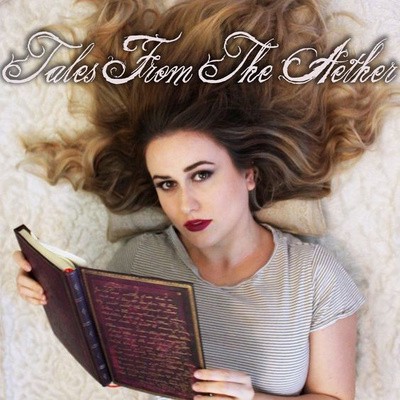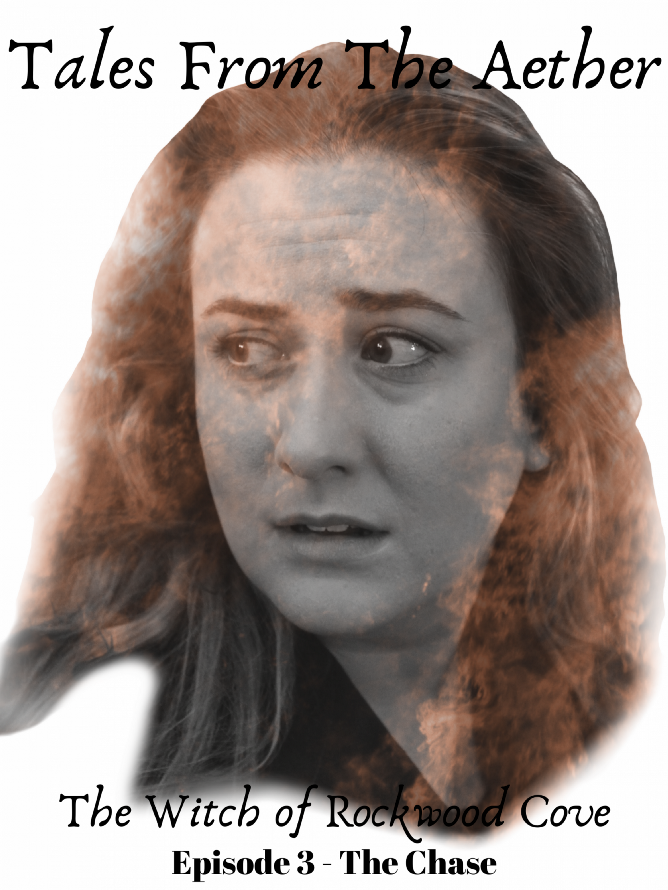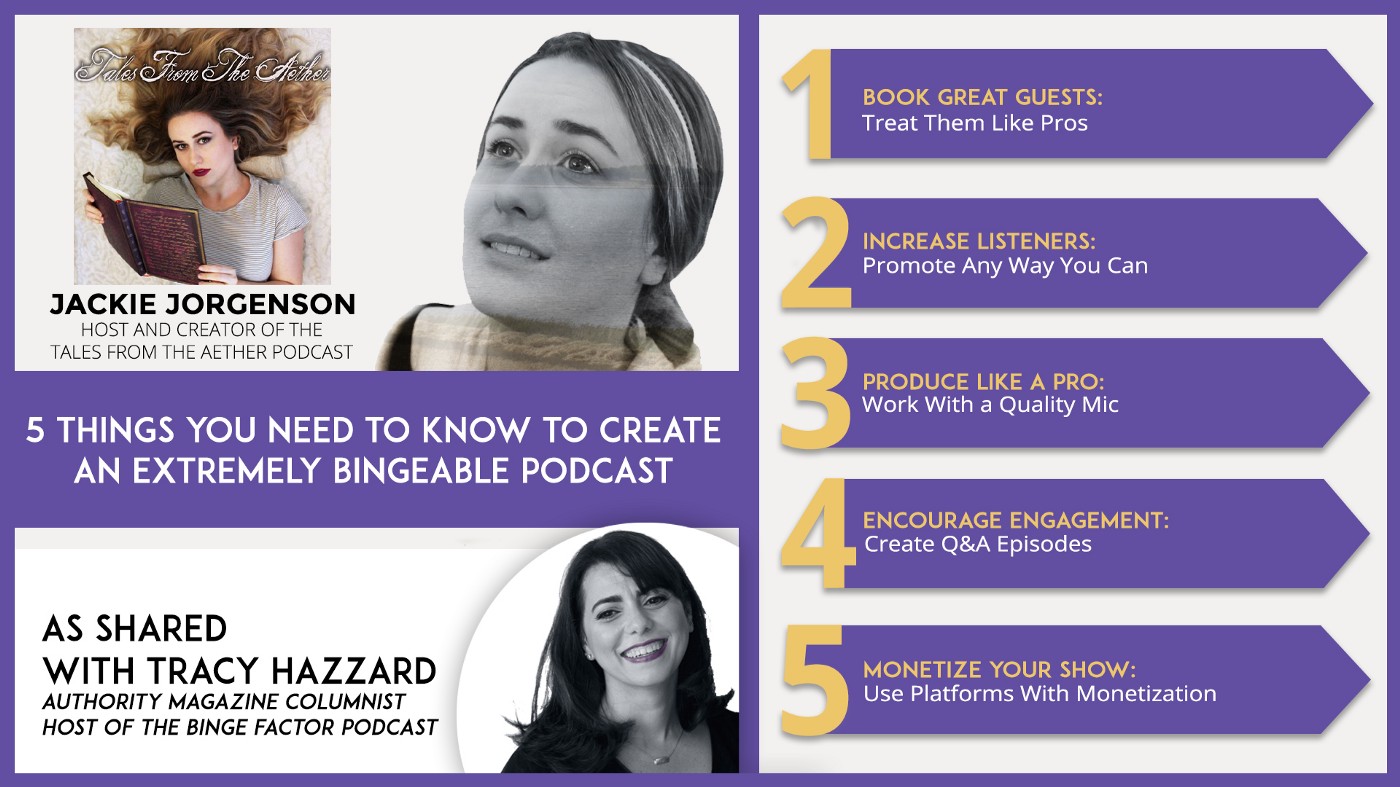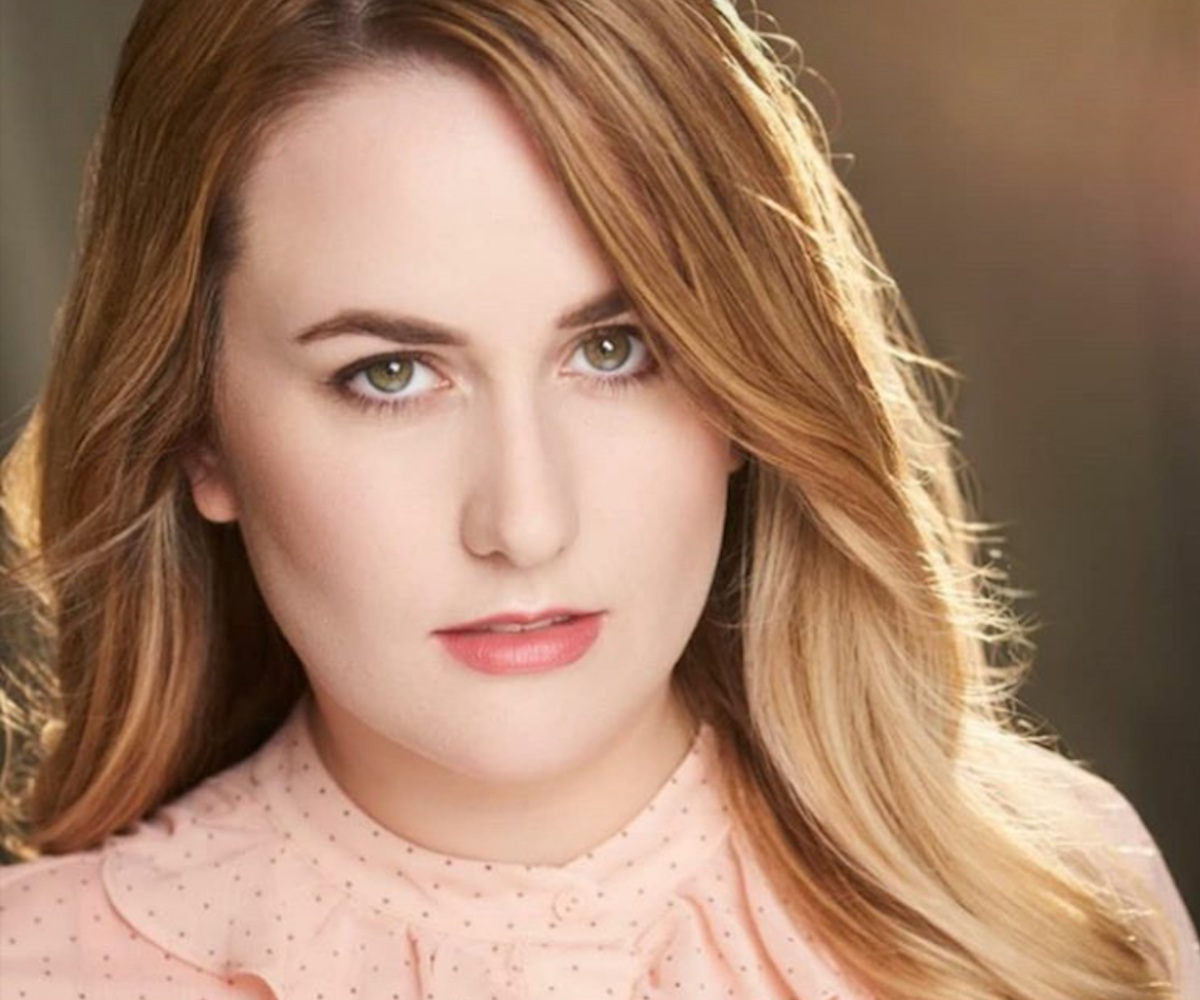“As a screenwriter, I take a cinematic approach to audio drama. I want each season, each story, to feel like a mini-movie you’re visualizing in your head. From my research, I’ve also seen a gap in creating original historical fiction and fantasy stories like mine, especially original fairy tales.”
Jackie Jorgenson of Tales from the Aether Podcast
Aspart of my series of interviews about “5 things you need to know to create a very bingeable podcast”, I had the pleasure of interviewing Jackie Jorgenson.
Jackie is an actor and writer with a comedy and classical background. She is also the creator of the original fairy tale anthology audio drama, Tales From The Aether, which was recently nominated for Best Podcast Series at TO Webfest. Season one follows a migrant witch who travels recently settled New England towns to cure them of the blight, rye ergot, hypothesized to be the real-life cause of the Salem witch trials.
Can you tell us a bit of your “personal backstory? What is your background and what eventually brought you to this particular career path?
I’ve been a screen actor for some time, with a focus on comedy, historical fiction, and fantasy. I moved to Michigan five years ago and it became clear to me that while I lived here it would be a good time to explore voice acting. I decided that through producing my own audio drama I would be able to focus in on character development through voice and accent work which would be a great benefit to me on screen as well. As a screenwriter, audio fiction has given me an opportunity to produce stories that would require a lofty budget to tell the story for the screen. So, it’s been quite a creatively fulfilling journey. One where I can play freely and not be afraid of letting someone else down as I learn and grow on my own projects.
Can you share a story about the most interesting thing that has happened to you since you started podcasting?
I love it when people reach out to tell me they’ve listened to the show. One interaction that has really stuck with me is a person who reached out just to say that they listened and really enjoyed what they heard, though they’re not usually a fan of historical stories. My hope is that the themes of my show are so universal and the characters feel real enough that people enjoy and relate to my audio drama. With this comment, it felt like my mission was accomplished. Encouragement can be such a powerful thing.
Can you share a story about the biggest or funniest mistake you made when you were first starting? Can you tell us what lesson or takeaways you learned from that?
I worked on an accent for season one. A Northern Irish accent. A very, very difficult accent to learn for a Canadian American like me because it’s not just how you pronounce the words, it’s the musicality of the inflections as well. On top of that, I worked on the personality of my character’s voice. She’s a bit of a quiet and shy woman to start and as the season grows, her voice becomes stronger. So, sometimes my lines wouldn’t sound quite right and I’d have to re-record. No big deal.
Well, my character is also a witch who casts her spells in Latin. There’s a scene in episode three, and I promise this isn’t too much of a spoiler, but she gets the wind knocked out of her when a wood plank crashes down from above. In the next scene, out of breath, angry, in Latin, in a Northern Irish accent, my character casts a spell at someone. Now, it’s hard enough to work with the two layers of accent and a shy character voice, but this felt like I set myself an impossible challenge.
Eventually, I get the line just the way I want it, I’m so proud of myself for meeting the challenge, and… you can’t hear it. See, my character is approaching another character. Her line needed to fade in at just the right moment to reveal her presence to the audience. All that work and it’s mostly undetectable. I couldn’t help but laugh. While the challenge was fun and I needed that line and its progression in raising the volume the closer she comes, maybe next time I won’t make it all so complicated.

How long have you been podcasting and how many shows have you aired?
I have been performing in and writing for various podcasts for a couple of years now. Besides my own, I’ve worked on comedic and dramatic stories for Alternative Stories and Fake Realities, as well as Listen, Rinse, Repeat, a show to help time your handwashing during this pandemic. Tales From The Aether is the first show of my own and we recently finished our first season.
What are the main takeaways, lessons or messages that you want your listeners to walk away with after listening to your show?
Since the show is a series of original fairy tales, each season comes with its own moral of the story. For season one, it fittingly explores the ways in which lighting yourself on fire to keep others warm can be destructive. However, all my stories will explore themes of injustice and inequality and the ways in which our systems and conditioning fail us.
In your opinion what makes your podcast binge-listenable? What do you think makes your podcast unique from the others in your category? What do you think is special about you as a host, your guests, or your content?
As a screenwriter, I take a cinematic approach to audio drama. I want each season, each story, to feel like a mini-movie you’re visualizing in your head. From my research, I’ve also seen a gap in creating original historical fiction and fantasy stories like mine, especially original fairy tales.
I also have brought on an incredibly talented cast and crew. It’s one of the reasons I end each season with a Q&A episode. No matter the size of the role, I’ve been lucky enough to bring on thoughtful, creative, and hard-working people who deserve the recognition we’ve received thus far.
Doing something on a consistent basis is not easy. Podcasting every work-day, or even every week can be monotonous. What would you recommend to others about how to maintain discipline and consistency? What would you recommend to others about how to avoid burnout?
Set your own schedule and don’t be afraid to break it. For my show, I plan to produce one season per year, but it could take longer depending on the research and writing phase. Yes, consistency is key when it comes to building an audience for your show, but, as my first season explores, it’s important to take care of yourself first and foremost. I’ve even noticed that when I take a day completely off, ideas flow more easily into my mind. So, if it really feels like you’re neglecting your work, consider that the work is just giving yourself a moment to become more open to new ideas.
What resources do you get your inspiration for materials from?
I take inspiration from the classic fairy tales we all know and love, and I also take inspiration from North American history. I feel like mixing the two allows me to find a new story worth creating. I also take inspiration from the injustices and inequalities I see in the world. I think it’s important to use my skills to point out the ways in which we treat each other or the ways in which our systems fail us.

Is there someone in the podcasting world who you think is a great model for how to run a really fantastic podcast?
Chris Gregory of Alternative Stories and Fake Realities is not only a creative collaborator, but he’s a major role model of mine. For me, it goes beyond creating captivating stories rooted in real, human emotions and conflicts, which he does with a high level of skill, but it’s the way he treats his team. Chris is one of the most supportive and engaged audio fiction creators out there and when you’re on his team, he makes it clear how valued you are. That is the kind of professionalism, care, and respect I hope to bring to my own projects.
What are the ingredients that make that podcast so successful? If you could break that down into a blueprint, what would that blueprint look like?
Where audio fiction is concerned, I believe that, first, a strong script is the foundation. By that I mean every single beat, every single word, every single silence serves a purpose and moves the story forward. For my own show, following the structure of a film was important to me and provided some guidance as to how the story could progress. By getting the script into a place where you can be confident in your choices, you set the rest of your team up for the best chance of succeeding.
After that, it’s important to bring on talent that delivers authentic performances and is capable of creating a rounded character or can create a score that suits the tone of the story and drives the action of the scene. There’s a lot of approaches to this stage of the work, whether the talent records together or not, whether the music is scored after a rough cut or not, but I believe the right way forward will differ depending on the various needs of the project. What doesn’t vary is that you must trust your collaborators along the way. You hired them for a reason.
Can you share with our readers the five things you need to know to create an extremely successful podcast?
- Be okay with failure. Whether your goal is to turn a profit or to win awards or to just tell the best story you can, failure can and will happen along the way. The most important thing is if you stand behind your creation 100% and have taken a leap of faith. Tales From The Aether took years to get the first season produced because writing and rewriting took some time and then for about a year I was waiting on some feedback on the script before moving forward. The patience paid off, however, and instead of dropping it because of some imaginary deadline I set myself, I was able to better craft the story and make it something I could really be proud of publishing.
- Respect your artistic collaborators and let go of perfectionism. And this is coming from a perfectionist. Of course, directing your actors is an essential part of getting the take you want from them, but by letting your team members make their own choices, follow their intuition, and truly collaborate, you’re seriously going to get a better product than you could have created on your own.
- Set realistic goals and then set KPIs (key performance indicators) to track your progress and how to shift course as you go. As I was in pre-production, production, and post-production, I set up a simple Google Doc to track what I wanted to be accomplished, in what stage, and how to do so — even including links so I knew where to go for resources. For me, these goals all involved outcomes I could control. From there, I broke down further goals of what needed to be accomplished each week or day. By breaking tasks down that way I could see the bigger picture but also focus in on individual tasks without feeling overwhelmed.
- If you’re writing something historical, do your research. Then once that’s done, do more research. Every single thing you can research, do research. Some of the feedback I got on my original script was essentially, “Yeah, the thing you have these Puritans do, well, they wouldn’t actually do that.” That’s when I realized I had made an assumption about Puritans when I clearly needed to sit down and read up on their lifestyle, belief systems, and, well, everything else. I wasn’t making an informed decision with my script, and it showed. This could easily take an audience member out of your story and dissuade them from continuing on. So, put the work in upfront in your research and it will pay off after release.
- Learn the business side. Understand your target audience and why they want to listen. Learn how to market your podcast once it’s out there. Figure out how you’re going to pay people. Make your casting calls full of relevant information that clarifies to your talent what they should expect in working with you. The more time you give yourself to study (there are some great, free marketing courses out there), create and mull over your material, and put your plan in place, the better outcomes you’ll have.
Jackie Jorgenson of Tales from the Aether Podcast shares the best way to:
1) Book Great Cast. The more you treat your talent like professionals, the more talent will be attracted to your casting call. Pay your cast what you can when you can. Create marketing materials for your talent to be able to use, but understand none of them are hired marketers.
2) Increase Listeners. Promote your show any way you can. While I don’t advise paying for likes and listens from fake accounts, as this will backfire, I do suggest posting on social media, including podcast focused Facebook groups, developing a press outreach strategy, submitting to festivals, and staying consistent with posting about your show.
3) Produce in a Professional Way. Each actor uses a different microphone in their own environment so it was important to make sure in editing that it didn’t sound like each character was in their own room with different levels of reverb or noise. Part of this was casting actors that worked with quality microphones and some of this was done in editing. Removing any background noises and leveling audio was crucial to maintaining the cohesive sound of the fictional environment.
4) Encourage Engagement. I created a Q&A episode to provide an opportunity for team members to direct listeners to their social media profiles, websites, and other projects. I felt like it was important that any casting directors, producers, or audio fiction enthusiasts know how to follow my talent’s work elsewhere.
5) Monetize. I publish and distribute my audio drama through Anchor which has built-in monetization options by adding advertisements to your episodes.

For someone looking to start their own podcast, which equipment would you recommend that they start with?
When I started, I bought a $20 Blue Snowball mic off eBay and that got me by for a while. Then, I invested a little more money to get an AT2020 mic which really upgrades the quality of sound at an affordable price. If you’re really not sure how seriously you want to take this interest, go for the Snowball. But, if you know you’re in it for the long haul, it could be more advantageous to save up a little more and go for an AT2020 that will take you further. Again, just to get you started.
If you could inspire a movement that would bring the most amount of good to the greatest amount of people, what would that be? You never know what your idea can trigger.
I would hope that through my work people turn more introspective and examine the ways they perpetuate harm toward themselves and others. As I’ve said, I believe we need to dismantle the ways in which our systems oppress and learn to recognize our privilege, our conditioning, and our problematic behavior in order to course-correct.


